Drivers not lured by lower gas prices
Frugal drivers aren't paying much attention to declining gas prices, as economic anxiety and volatile oil prices persist.

NEW YORK (CNNMoney.com) -- Gasoline prices extended a month-long decline but drivers are not being easily lured back to the road, despite an uptick in demand.
The national average price of a gallon of gas dropped 3.4 cents to $2.889, according to a survey of credit card swipes at gasoline stations by motorist group AAA.
The national average is now about 30% below the record-high price of $4.114 on July 17, but 15 states are still selling gas at $3 a gallon or more. The highest prices are in Alaska ($3.84) and Hawaii ($3.79) and the lowest are in Oklahoma ($2.46) and Kansas ($2.52).
In the past month alone, prices are down an average of 25% and are just 7 cents shy of year-earlier levels.
While demand is edging higher, there still appear to be fewer consumers on the road when compared with this time last year.
U.S. gasoline demand rose 2.6% during the week ended Oct. 17, according to the MasterCard Spending Pulse report, which tracks national retail sales.
However, demand levels are down 6.4% from a year ago and are also lower than during the summer months. Last week, 62.9 million barrels were sold at retail locations, compared to 66.9 million barrels that were sold during the same week in July when gasoline prices surged to a record high. One barrel is equivalent to 42 U.S. gallons.
"Statistically, the sharp drop in prices has not resulted in demand recovery, as it has been offset by shrinking home values, 401(k)s and cash in pockets," said Ben Brockwell, director of Data, Pricing & Information Services at Oil Price Information Service in Wall, N.J. "Additionally, the change has happened so quickly that consumers are wondering if it's real. They're not going to touch the stove if it's not cooled off."
According to Brockwell, gas demand during the work week has stayed relatively steady, up only 0.5% to 1% since prices started to drop more than a month ago. But weekend driving has shown a dramatic decrease, with demand falling 7% to 10% from a year ago.
James Fisher, a professor at St. Louis University and an expert on consumer behavior, agrees that the gloomy economic environment, coupled with unpredictable oil prices, has left consumers wary. "People are skittish about the future of energy prices and they lack confidence in the future of their economic situation, which translates to disciplined spending," he said. "Though they may be pleased to see the price per barrel plunge, they're going to think twice before taking that road trip or using the car get doesn't get good mileage."
Also, habits are hard to break, and now that Americans are in the mindset of consuming less, they're not going to go back to their old ways tout de suite, according to Kit Yarrow, Department Chair of Psychology at Golden Gate University.
In addition to financial woes, Brockwell believes a surge in the demand for fuel-efficient cars due to recent record-breaking gas prices and a heightened eco-consciousness may also be contributing to fewer sales at gas stations. While actual sales of hybrids have decreased, along with sales across the rest of the auto industry, JD Power and Associates confirms that the sales share of hybrids has risen within the light vehicle category.
"People became mindful of their consumption, but they realized the ramifications of driving more were both financial and ecological," added Yarrow. "Now they've developed this consciousness, they can't just suddenly stop thinking about it."
But gas station owners don't think heightened environmental awareness is the reason for the consumer's reticence at the pump.
"I've seen hybrids, but the conversations with my customers have been more about 401(k)s," said David Johnson, of Sunset Service Station in South Weymouth, Mass. "One of my customers this morning was talking about having to buy canned tomatoes - it's really the general economic conditions that have people cutting back."
Though he is able to buy and sell gasoline at cheaper prices because his station isn't branded, his customers are still pulling the reins when it comes to filling up. ![]()



